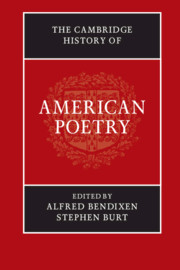
- Cited by 2
-
Cited byCrossref Citations
This Book has been cited by the following publications. This list is generated based on data provided by Crossref.
Ramazani, Jahan 2016. Lines and Circles: Transnationalizing American Poetry Studies. American Literary History, Vol. 28, Issue. 2, p. 308.
2019. Books Reviewed: Anglia 133–136 (2015–2018). Anglia, Vol. 137, Issue. 1, p. 202.
- Publisher:
- Cambridge University Press
- Online publication date:
- December 2014
- Print publication year:
- 2014
- Online ISBN:
- 9780511762284
- Subjects:
- Literature, Area Studies, American Literature, American Studies
- Collection:
- Cambridge Histories - Literature




